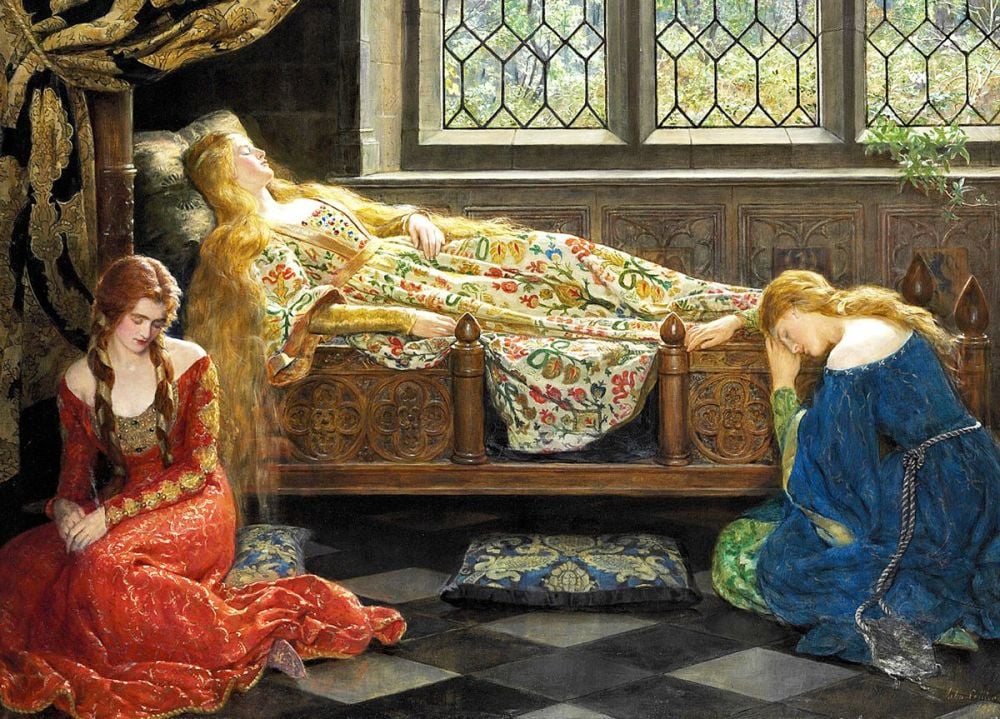ESTER FREIDER contemplates princesshood, the vita contemplativa, and Byung Chul Han’s latest book.
‘Play is the essence of beauty. When life follows the rule of stimulus-response, need-satis- faction and goal-action, it atrophies into pure survival: naked biological life. Life receives its radiance only from inactivity.’
– Vita Contemplativa
As someone with an overgrown, nearly tumorous vita activa, Vita Contemplativa was 100 pages of pure therapy. In this treatise, Byung Chul Han attacks modern (read: neoliberal) hypervalues such as individualization, progress, and visibility. Yet, he delivers his thesis with a soothing lyric that feels like the watering of a flower. He wades through the action-crazed muck of the Heidegger-Arendt industrial complex with a garden of wisdoms from ancient Greeks and early Romantics, bringing the reader face to face with his own secret tiredness: every modern subject’s clandestine, long-repressed need to…dissolve, play, and get lost. At one point, he gently knocks aside Arendt’s misreading of the Greek idea of daimonship with a pace (latin for peace, or a sort of “no offense intended”) to reunite it with the significance of inactive contemplation—classic BCH.
Han concludes by hoping for a return to the ‘self-forgetfulness’ that we used to find through Godly worship, but renewed through a more atheistic loss of oneself through submission to the sublimity of the universe. He says that, through this practice of self-disavowal, we can regain a sense of true life—of thriving, rather than just surviving. Ultimately, for Han, a life of luxury does not signify the hunting of commodities, but quite the opposite: the ability to just exist without precariously imposing the ‘I’ over any manifestation of beauty. Luxury is nonaction, is an opening, is a wound that lets the light take you.
As someone who currently studies online girlifications and the best way to navigate them, I actually first encountered this argument for “self-forgetfulness” through Bogna Konior’s suggestion that perhaps the intelligence of the future is found not in vocalization, but rather in the silent imperceptibility of the ‘swarm’. When one abstains from the dominant push on social media to establish (and sell) a self, and rather play with a multiplicity of characters, they are released from the capitalist burden of finalizing their subjectivity for reproduction. For Konior, the swarm is the camouflage that an online actor wears in order to access that beauty of the infinite without feeling like its voyeur. The swarm could be said to protect a digital vita contemplativa—letting its hidden actor bathe in a shimmer of content.
In my dissertation, I created the figure of the pirate to describe a ‘hacker’-like figure which uses the internet as it isn’t supposed to be used. The pirate engages in ‘the practice of nomadologically self-curating a personal identity through transgressive acts of information distribution’. A disruptor and a re-maker, she is steeped in Deleuzian ideas about rhizomaticism through-and-through. Her potency is found by refusing the concept of ownership, and using fluidity as a tool through which the commodity is set free.

However, Han and Konior cause me to consider the character-foil (maybe, the shadow in the Jungian sense) of the pirate, which is of course, the princess. Whereas the pirate participates in an active re-casting of concepts in the hopes of self-liberation, the princess simply refuses to participate. She instead takes pleasure in so-called archaic or regressive conceptions of a full life—spoiled by food, clothes, books, and a huge pointless castle, she is just playing. She’s a lover (embracer), not a hater (critiquer). She is timeless, eternally young and vaguely beautiful…yet, crucially, unaware of it.
I don’t mean to create a figure that evokes the obviously terrible violence that allowed monarchies to maintain a private opulence in the past, just as my idea of the pirate is not explicitly about men who thieve and kill. Rather, my image of the princess is based on a general prairie of imagination that every child had growing up: the desire to be free to play, eternally. This ahistoric longing of childhood has, in recent generations, been explicitly tied to the mythos of Disney princesses, in which each heart-faced girl is granted the ‘happily ever after’—very akin to Han’s characterisation of the vita contemplativa as an ‘eternity that transcends the contemporary world and time itself’. The princess is a vision for BCH’s conception of possessionless luxury: she pushes for an enchantment of life that happens simply through the act of living. The alcoves of her walls are strewn with carved angels, dripping like dew drops. Her mile-long rose garden, glittering amaranthine at all hours, will live and die, over and over. She refuses to trademark her angels, sell her roses, or document her life. She is the present itself.
I don’t mean to imply that people are either pirates or princesses. As cultural producers, we are conditioned to forget this pink realm of directionless play. We must communicate constantly in order to have a handle in our personal security as well as one in the direction of culture. We sacrifice inaction in the hopes that our new and different action will create a better world. In this way, we are all pirates by necessity. The princess is rather a vision of us in this better world that we dream of—a world in which we are capable of refusing action, especially as a measure of our value. We do sometimes, in sweet and quiet moments, access this better world and merge with our princesshood. When we arrange a bouquet for our lover, drink a second bottle of wine, or keep unread books in stacks in our bedrooms, we glitter into princesses. When we waste time, in any sense of the term, for our own pleasure…we are total princesses, touching the symbolon that connects us to the divinity of excess.
While the desire for everyday luxury often evokes accusations of class privilege, I think that I’d like to take Audre Lorde’s proposition that ‘poetry is not a luxury’ and push for a more radical case that, well, luxury is not a luxury. Hoarding millions while others starve is clearly evil. But the vita contemplativa that one can access through losing oneself in beauty is something that everyone needs to feel more-than-machine. Gabi Abrao (a modern prophet, if there was one) theorizes something she calls ‘sneaky luxury’ in her recent post. She presses that luxury is available to everyone as a ‘gift from God’, and the idea that it is a privilege to the ‘gilded jobless LA life’ is ‘sinisterly untrue’:

I think that Abrao’s take would be completely BCH approved. It also proposed the alembication that constitutes princesshood as something that drives one to flick off capitalist norms: in this case, through tricking bosses, trespassing, and most crucially, taking time to do nothing. While princesshood may be something we can only access for a few minutes a day, it is what our active life—our pirate life—serves to enable and protect. I believe that even as we posit ourselves, both IRL and online, as potential figureheads for change, maybe what we actually dream of is to be an anonymous observer of everyday delights, unrushed and unbothered.
When you leave the building you are in while reading this, I request you to do a small practice of vita contemplativa. Stand on the pavement and try to avoid any cracks. Close your eyes and breathe in with your nose. Measure the coolness of the air, the tiredness of your eyes, and the cluttered cadence of voices and cars. Like yoga: think about nothing but right now. Because, if you ever need a break, that’s where your fairytale is—in a total and exquisite love of right now.
Featured image: John Collier, The Sleeping Beauty, 1921. Source: The Hopkins Collection.





